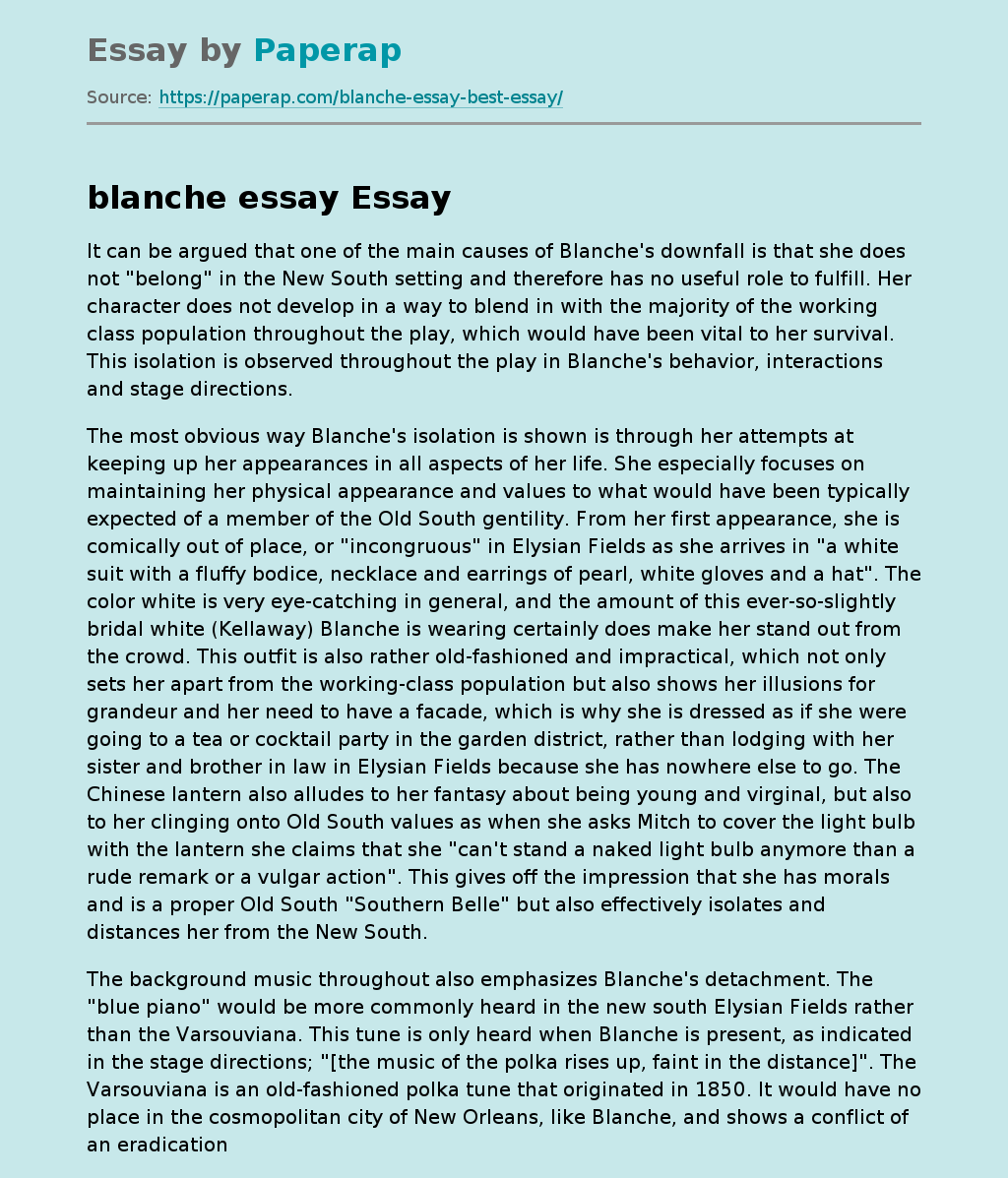Blanche's Downfall Essay
It can be argued that one of the main causes of Blanche’s downfall is that she does not “belong” in the New South setting and therefore has no useful role to fulfill. Her character does not develop in a way to blend in with the majority of the working class population throughout the play, which would have been vital to her survival. This isolation is observed throughout the play in Blanche’s behavior, interactions and stage directions.
The most obvious way Blanche’s isolation is shown is through her attempts at keeping up her appearances in all aspects of her life.
She especially focuses on maintaining her physical appearance and values to what would have been typically expected of a member of the Old South gentility. From her first appearance, she is comically out of place, or “incongruous” in Elysian Fields as she arrives in “a white suit with a fluffy bodice, necklace and earrings of pearl, white gloves and a hat”.
The color white is very eye-catching in general, and the amount of this ever-so-slightly bridal white (Kellaway) Blanche is wearing certainly does make her stand out from the crowd.
This outfit is also rather old-fashioned and impractical, which not only sets her apart from the working-class population but also shows her illusions for grandeur and her need to have a facade, which is why she is dressed as if she were going to a tea or cocktail party in the garden district, rather than lodging with her sister and brother in law in Elysian Fields because she has nowhere else to go.
The Chinese lantern also alludes to her fantasy about being young and virginal, but also to her clinging onto Old South values as when she asks Mitch to cover the light bulb with the lantern she claims that she “can’t stand a naked light bulb anymore than a rude remark or a vulgar action”. This gives off the impression that she has morals and is a proper Old South “Southern Belle” but also effectively isolates and distances her from the New South.
The background music throughout also emphasizes Blanche’s detachment. The “blue piano” would be more commonly heard in the new south Elysian Fields rather than the Varsouviana. This tune is only heard when Blanche is present, as indicated in the stage directions; “[the music of the polka rises up, faint in the distance]”. The Varsouviana is an old-fashioned polka tune that originated in 1850. It would have no place in the cosmopolitan city of New Orleans, like Blanche, and shows a conflict of an eradication of a way of life and appreciation of classical music while the jazzy blue piano increases in popularity.
Besides being out of touch with the modern world, this polka tune is only heard by Blanche as it is in her head as a symbol of the night Allan died. It is only apparent that nobody else except for Blanche can hear it in scene 9, where Mitch asks her if she is “boxed out of her mind” when Blanche talks about hearing the revolver shot which stops the music. Blanche appears to be unaware if she is living in the past with Allan or in the present with Stanley. This is clearly indicated by the Varsouviana bleeding into the blue piano tune, which shows the result of a combination of the motives of the two male characters; even though Allan is never actually physically present. From this juxtaposition, an incongruous brotherhood is achieved, from which Blanche is ostracized (John S. Bak)
From their first appearances, there is a clear contrast between how the Dubois sisters have adapted themselves to the modernizing world. Blanche insists on sticking to her Old South values and attitudes whereas Stella has more or less become a part of the community of Elysian Fields and so a typical New South woman, an identity which is vital to her survival. This is most evident in scene 4, when Blanche speaks plainly to Stella while not knowing that Stanley has overheard. She tells Stella very blatantly that Stanley “acts like an animal, has an animal’s habits! Eats like one, moves like one, talks like one!”.
This dehumanization is important because it shows Blanche’s superior attitude and disdain for the New South and working class people at its finest. It establishes that Blanche cannot ever belong to this new world unless she changes her attitude, which she never does. Even at the very end, before her metaphorical death at the hands of Stanley, she still draws on animal, specifically pig, imagery to insult Stanley, which ultimately causes him to snap as well, when she says that she has been a fool for “casting my pearls before swine!” Blanche’s tendency to insult Stanley for being a “pig” or “Polak” may reflect her own insecurities which represents weakness and failure. This shows that she never changes throughout, which effectively seals her fate.
Blanche's Downfall Essay. (2019, Dec 10). Retrieved from https://paperap.com/blanche-essay-best-essay/

